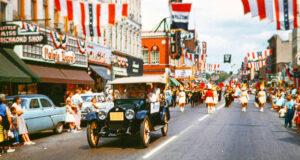7 timeless poems to enjoy this Christmas
Published on December 22, 2024

Christmas time is full of poetry.
Some poems are put to music, like “The First Noel” or “Silent Night.” Others are more narrative, like Dr. Seuss’ classic book The Grinch or Clement Clarke Moore’s “The Night Before Christmas.”
Playful, sweet, or solemn, all forms of Christmas poetry have the power to capture the reason for the season in all its paradoxical largeness and smallness.
Here is a list of some of my favorite Christmas poems from a variety of authors and a variety of years. I think they are best enjoyed cuddled up with a warm drink and read aloud with loved ones—enjoy and Merry Christmas!
“The Burning Babe” (1595)
by Robert Southwell, SJ
As I in hoary winter’s night stood shivering in the snow,
Surpris’d I was with sudden heat which made my heart to glow;
And lifting up a fearful eye to view what fire was near,
A pretty Babe all burning bright did in the air appear;
Who, scorched with excessive heat, such floods of tears did shed
As though his floods should quench his flames which with his tears were fed.
“Alas!” quoth he, “but newly born, in fiery heats I fry,
Yet none approach to warm their hearts or feel my fire but I!
My faultless breast the furnace is, the fuel wounding thorns,
Love is the fire, and sighs the smoke, the ashes shame and scorns;
The fuel Justice layeth on, and Mercy blows the coals,
The metal in this furnace wrought are men’s defiled souls,
For which, as now on fire I am to work them to their good,
So will I melt into a bath to wash them in my blood.”
With this he vanish’d out of sight and swiftly shrunk away,
And straight I called unto mind that it was Christmas day.
“Christ’s Nativity” (1650s)
by Henry Vaughn
Awake, glad heart! get up and sing!
It is the birth-day of thy King.
Awake! awake!
The Sun doth shake
Light from his locks, and all the way
Breathing perfumes, doth spice the day.
Awake, awake! hark how th’ wood rings;
Winds whisper, and the busy springs
A concert make;
Awake! awake!
Man is their high-priest, and should rise
To offer up the sacrifice.
I would I were some bird, or star,
Flutt’ring in woods, or lifted far
Above this inn
And road of sin!
Then either star or bird should be
Shining or singing still to thee.
I would I had in my best part
Fit rooms for thee! or that my heart
Were so clean as
Thy manger was!
But I am all filth, and obscene;
Yet, if thou wilt, thou canst make clean.
Sweet Jesu! will then. Let no more
This leper haunt and soil thy door!
Cure him, ease him,
O release him!
And let once more, by mystic birth,
The Lord of life be born in earth.
“In Memoriam” A. H. H. OBIIT MDCCCXXXIII: 106 (1850)
by Alfred, Lord Tennyson
Ring out, wild bells, to the wild sky,
The flying cloud, the frosty light:
The year is dying in the night;
Ring out, wild bells, and let him die.
Ring out the old, ring in the new,
Ring, happy bells, across the snow:
The year is going, let him go;
Ring out the false, ring in the true.
Ring out the grief that saps the mind
For those that here we see no more;
Ring out the feud of rich and poor,
Ring in redress to all mankind.
Ring out a slowly dying cause,
And ancient forms of party strife;
Ring in the nobler modes of life,
With sweeter manners, purer laws.
Ring out the want, the care, the sin,
The faithless coldness of the times;
Ring out, ring out my mournful rhymes
But ring the fuller minstrel in.
Ring out false pride in place and blood,
The civic slander and the spite;
Ring in the love of truth and right,
Ring in the common love of good.
Ring out old shapes of foul disease;
Ring out the narrowing lust of gold;
Ring out the thousand wars of old,
Ring in the thousand years of peace.
Ring in the valiant man and free,
The larger heart, the kindlier hand;
Ring out the darkness of the land,
Ring in the Christ that is to be.
“In the Bleak Midwinter” (1872)
by Christiana Rossetti
In the bleak midwinter, frosty wind made moan,
Earth stood hard as iron, water like a stone;
Snow had fallen, snow on snow, snow on snow,
In the bleak midwinter, long ago.
Our God, Heaven cannot hold Him, nor earth sustain;
Heaven and earth shall flee away when He comes to reign.
In the bleak midwinter a stable place sufficed
The Lord God Almighty, Jesus Christ.
Enough for Him, whom cherubim, worship night and day,
Breastful of milk, and a mangerful of hay;
Enough for Him, whom angels fall before,
The ox and ass and camel which adore.
Angels and archangels may have gathered there,
Cherubim and seraphim thronged the air;
But His mother only, in her maiden bliss,
Worshipped the beloved with a kiss.
What can I give Him, poor as I am?
If I were a shepherd, I would bring a lamb;
If I were a Wise Man, I would do my part;
Yet what I can I give Him: give my heart.
“The Oxen” (1915)
by Thomas Hardy
Christmas Eve, and twelve of the clock.
“Now they are all on their knees,”
An elder said as we sat in a flock
By the embers in hearthside ease.
We pictured the meek mild creatures where
They dwelt in their strawy pen,
Nor did it occur to one of us there
To doubt they were kneeling then.
So fair a fancy few would weave
In these years! Yet, I feel,
If someone said on Christmas Eve,
“Come; see the oxen kneel,
“In the lonely barton by yonder coomb
Our childhood used to know,”
I should go with him in the gloom,
Hoping it might be so.
“Star of the Nativity” (1987)
by Joseph Brodsky
In the cold season, in a locality accustomed to heat more than
to cold, to horizontality more than to a mountain,
a child was born in a cave in order to save the world;
it blew as only in deserts in winter it blows, athwart.
To Him, all things seemed enormous: His mother’s breast, the steam
out of the ox’s nostrils, Caspar, Balthazar, Melchior—the team
of Magi, their presents heaped by the door, ajar.
He was but a dot, and a dot was the star.
Keenly, without blinking, through pallid, stray
clouds, upon the child in the manger, from far away—
from the depth of the universe, from its opposite end—the star
was looking into the cave. And that was the Father’s stare.
“A Christmas Hymn” (1961)
by Richard Wilbur
“Some of the Pharisees in the crowd said to him, “Teacher, order your disciples to stop.” He answered, “I tell you, if these were silent, the stones would shout out.”
— Luke 19:39–40



